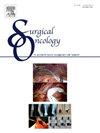The impact of demographics and socioeconomic status on the receipt of immunotherapy for stage III melanoma
IF 2.3
4区 医学
Q3 ONCOLOGY
引用次数: 0
Abstract
Background
There is limited data examining potential disparities in the receipt of immunotherapy among patients with stage III melanoma.
Methods
We performed a retrospective cohort review using the National Cancer Database (NCDB) including adult patients with stage III melanoma between 2004 and 2017. We compared receipt of immunotherapy based on demographic and socioeconomic factors for patients diagnosed 2004–2014 and 2016–2017, before and after FDA approval of immune checkpoint blockade.
Results
12,099 patients were included. The proportion of stage III patients who received immunotherapy significantly increased over time, from 24.0 % in 2004–2014 to 43.7 % in 2016–2017 (p < 0.001). There was a significant difference in patients who receive immunotherapy based on age (p < 0.001), insurance (p < 0.001), facility location (p < 0.001).On multivariable analysis, increased odds of immunotherapy receipt were found in patients with diagnosis in 2016–2017 (adjusted odds ratio (aOR) 3.3, 95 % CI 2.9–3.7), younger age (65–80 years aOR 0.43, 95 % CI 0.35–0.52), Hispanic ethnicity (aOR 1.5, 95 % CI 1.1–2.1), and private insurance (not insured aOR 0.67, 95 % CI 0.52–0.85).
Conclusions
Although narrowing, gaps persist in the receipt of immunotherapy after FDA approval. Understanding disparities in the receipt of immunotherapy will aid in understanding barriers to treatment and ensuring patients have equitable access to advanced care.
人口统计学和社会经济地位对接受 III 期黑色素瘤免疫疗法的影响
背景目前研究III期黑色素瘤患者接受免疫疗法的潜在差异的数据有限。方法我们利用美国国家癌症数据库(NCDB)进行了一项回顾性队列研究,纳入了2004年至2017年间的III期黑色素瘤成年患者。我们比较了 2004-2014 年和 2016-2017 年确诊的患者在 FDA 批准免疫检查点阻断疗法之前和之后根据人口统计学和社会经济因素接受免疫疗法的情况。随着时间的推移,接受免疫治疗的 III 期患者比例明显增加,从 2004-2014 年的 24.0% 增加到 2016-2017 年的 43.7%(p <0.001)。根据年龄(p <0.001)、保险(p <0.001)、医疗机构所在地(p <0.001),接受免疫治疗的患者存在明显差异。经多变量分析发现,2016-2017年确诊的患者接受免疫治疗的几率增加(调整后的几率比(aOR)为3.3,95 % CI 2.9-3.7)、年龄较小(65-80 岁 aOR 0.43,95 % CI 0.35-0.52)、西班牙裔(aOR 1.5,95 % CI 1.1-2.1)和私人保险(未保险 aOR 0.67,95 % CI 0.52-0.85)。了解接受免疫疗法方面的差距将有助于了解治疗障碍,并确保患者能够公平地获得先进的医疗服务。
本文章由计算机程序翻译,如有差异,请以英文原文为准。
求助全文
约1分钟内获得全文
求助全文
来源期刊

Surgical Oncology-Oxford
医学-外科
CiteScore
4.50
自引率
0.00%
发文量
169
审稿时长
38 days
期刊介绍:
Surgical Oncology is a peer reviewed journal publishing review articles that contribute to the advancement of knowledge in surgical oncology and related fields of interest. Articles represent a spectrum of current technology in oncology research as well as those concerning clinical trials, surgical technique, methods of investigation and patient evaluation. Surgical Oncology publishes comprehensive Reviews that examine individual topics in considerable detail, in addition to editorials and commentaries which focus on selected papers. The journal also publishes special issues which explore topics of interest to surgical oncologists in great detail - outlining recent advancements and providing readers with the most up to date information.
 求助内容:
求助内容: 应助结果提醒方式:
应助结果提醒方式:


